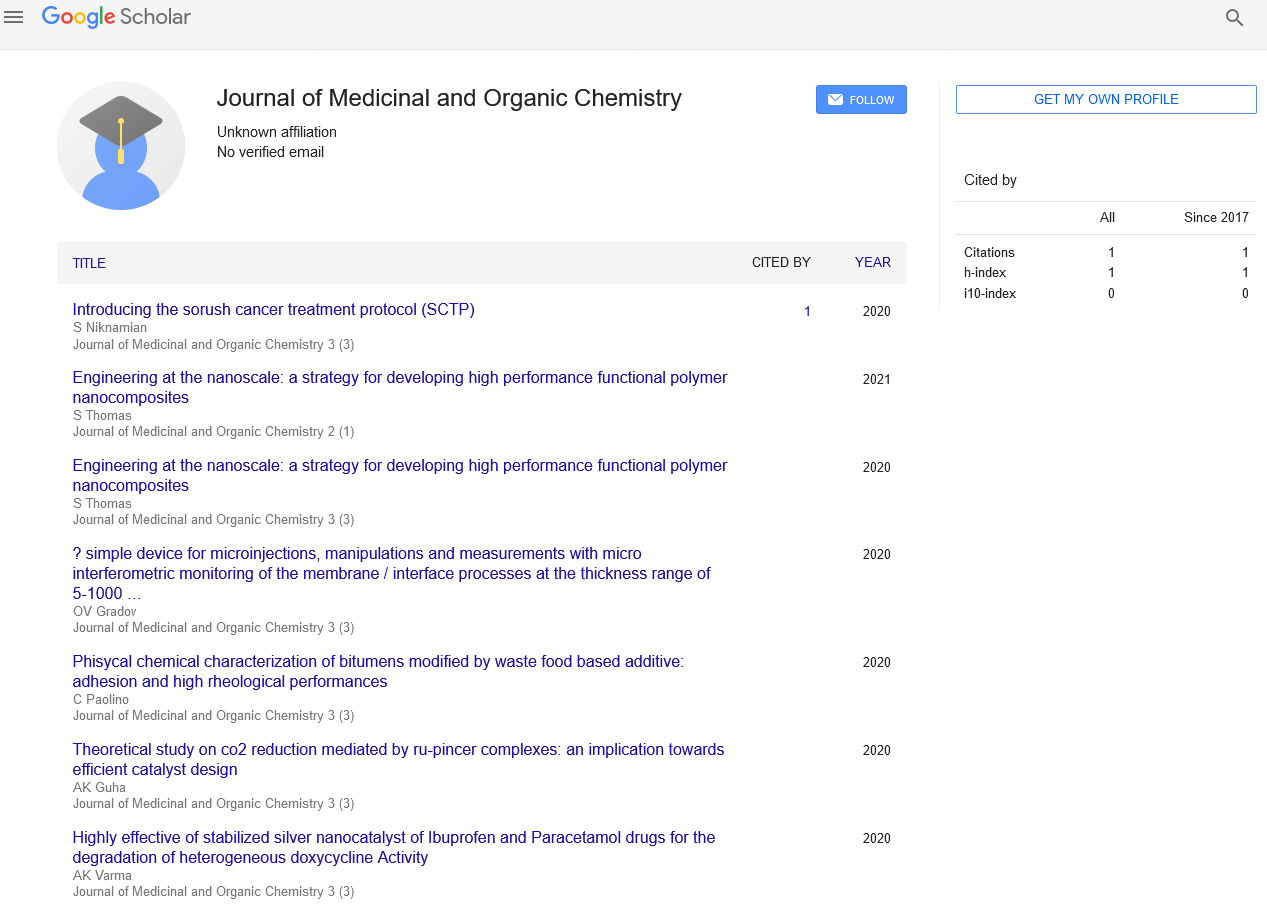Perspective - Journal of Medicinal and Organic Chemistry (2024) Volume 7, Issue 3
Unraveling the Patterns of Disease: A Comprehensive Exploration of Epidemiology
- Corresponding Author:
- Maria Kerbay
Department of Clinical Research,
Catholic University,
Sao Paulo,
Brazil
E-mail: maria.kerbay@einstein.br
Received: 04-May-2024, Manuscript No. jmoc-24-134121; Editor assigned: 08-May-2024, PreQC No. jmoc-24-134121 (PQ); Reviewed: 22-May-2024, QC No. jmoc-24-134121; Revised: 07-Jun-2024, Manuscript No. jmoc-24-134121 (R); Published: 14-Jun-2024, DOI: 10.37532/jmoc.2024.7(3).211-212
Introduction
Epidemiology, the study of the distribution and determinants of health-related events in populations, serves as a cornerstone of public health, informing efforts to prevent, control, and mitigate the impact of diseases on communities worldwide. From infectious outbreaks to chronic conditions, epidemiologists investigate the patterns, causes, and consequences of disease occurrence, employing a diverse array of methods and approaches to uncover insights that shape health policy and practice. In this article, we embark on a journey through the multifaceted realm of epidemiology, exploring its foundational principles, methodological techniques, and far-reaching implications for global health.
Description
Understanding epidemiology
At its core, epidemiology seeks to understand the distribution and determinants of disease within populations, as well as the factors that influence health outcomes over time. By examining patterns of disease occurrence, epidemiologists can identify risk factors, track disease trends, and assess the effectiveness of interventions aimed at reducing morbidity and mortality. Epidemiology encompasses a broad spectrum of diseases and health conditions, including infectious diseases, chronic diseases, injuries, environmental exposures, and social determinants of health.
Key concepts in epidemiology
Epidemiology is guided by several key concepts and principles that underpin its methodology and practice:
Disease occurrence: Epidemiologists investigate the frequency and distribution of diseases within populations, using measures such as incidence, prevalence, and mortality rates to quantify disease burden and assess disease trends over time.
Disease determinants: Epidemiologists identify and study the factors that influence the occurrence and distribution of diseases, including genetic, environmental, behavioral, and social determinants of health. By understanding these determinants, researchers can develop targeted interventions to prevent and control disease.
Study designs: Epidemiological studies employ a variety of study designs to investigate the association between exposures and outcomes. These include observational studies such as cohort studies, case-control studies, and cross-sectional studies, as well as experimental studies such as Randomized Controlled Trials (RCTs). Each study design has its strengths and limitations, and the choice of design depends on the research question and available resources.
Methods and approaches in epidemiology
Epidemiologists employ a variety of methods and approaches to investigate disease occurrence and identify risk factors. These include:
Surveillance: Epidemiological surveillance involves the systematic collection, analysis, and interpretation of health data to monitor disease trends, detect outbreaks, and inform public health action. Surveillance systems may involve passive reporting by healthcare providers, active case-finding through surveys and screening programs, or syndromic surveillance using data from emergency departments and other sources.
Descriptive epidemiology: Descriptive epidemiological studies characterize the distribution of diseases within populations, including demographic patterns, geographic variations, and temporal trends. These studies provide valuable insights into disease burden and help prioritize public health interventions.
Analytical epidemiology: Analytical epidemiological studies investigate the determinants of disease occurrence by comparing exposed and unexposed groups to assess the association between exposures and outcomes. Cohort studies follow a group of individuals over time to measure the incidence of disease in relation to exposure status, while case-control studies compare individuals with and without the disease to identify risk factors.
Applications and impact of epidemiology
Epidemiology has a profound impact on public health policy, practice, and research, influencing decisions at the local, national, and global levels. Epidemiological findings inform disease surveillance systems, outbreak investigations, vaccination programs, screening initiatives, and health promotion efforts aimed at reducing the burden of disease and improving population health.
Epidemiology also plays a critical role in understanding and addressing health disparities, inequalities, and social determinants of health. By identifying populations at higher risk of disease and the underlying factors driving these disparities, epidemiologists can advocate for targeted interventions and policies that address root causes and promote health equity.
Future directions in epidemiology
As the field of epidemiology continues to evolve, so too do the challenges and opportunities it faces. Emerging areas of interest include:
Precision epidemiology: Precision epidemiology seeks to tailor public health interventions to the specific needs and characteristics of individuals and populations, taking into account genetic, environmental, and social factors. By leveraging advances in data science, genomics, and personalized medicine, precision epidemiology aims to optimize the effectiveness and efficiency of public health interventions.
One health approach: The One Health approach recognizes the interconnectedness of human, animal, and environmental health and seeks to address complex health challenges through interdisciplinary collaboration. By integrating epidemiology, veterinary medicine, environmental science, and other disciplines, One Health initiatives aim to prevent zoonotic diseases, antimicrobial resistance, and other threats to global health security.
Conclusion
Epidemiology stands as a vital science for understanding the distribution and determinants of disease and improving population health. By investigating disease patterns, identifying risk factors, and evaluating interventions, epidemiologists play a crucial role in preventing, controlling, and mitigating the impact of diseases on communities worldwide. As we continue to confront new challenges and opportunities in public health, epidemiology remains an essential tool for promoting health equity, addressing emerging threats, and advancing the well-being of individuals and populations.

